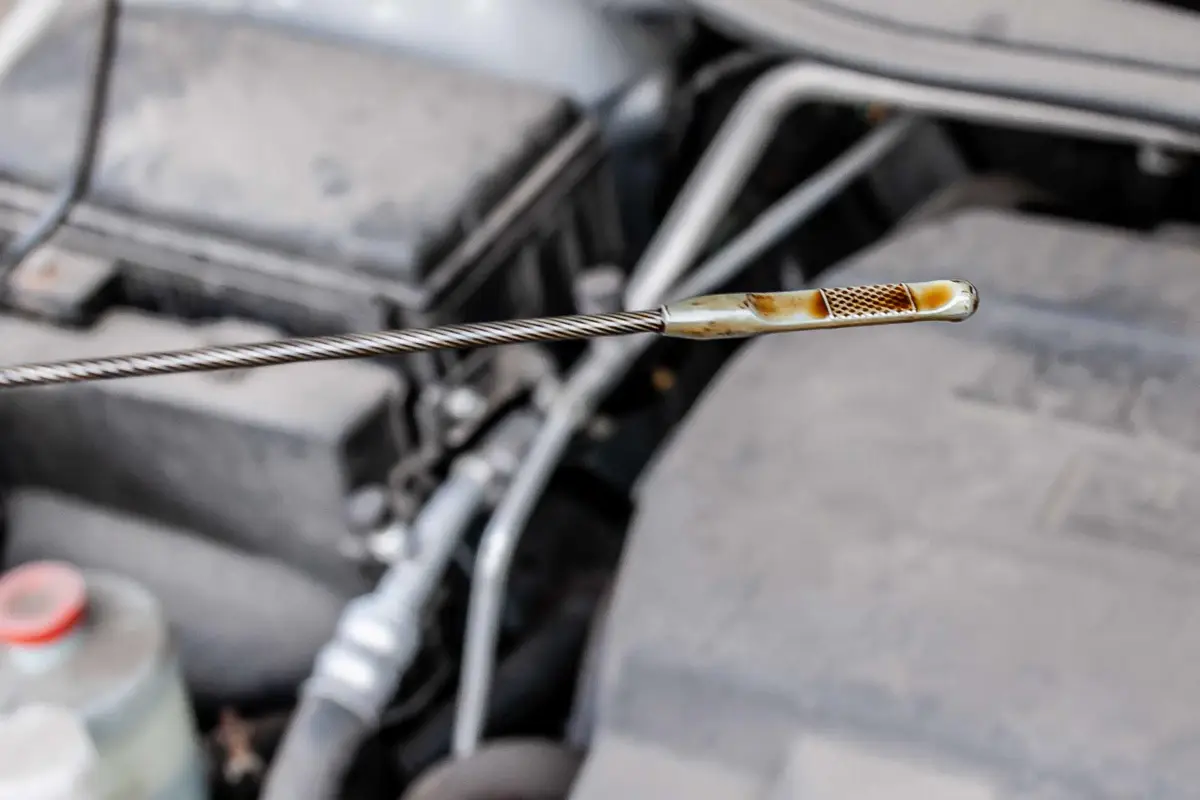Overfilling engine oil can lead to increased pressure, reduced lubrication, and potential engine damage. It is crucial to follow manufacturer recommendations for the correct oil levels to avoid such issues.
Ensuring the proper amount of oil in your engine is essential for optimal performance and longevity. Overfilling the oil reservoir can have detrimental effects on your engine’s functionality and may result in costly repairs.
Understanding the importance of maintaining the correct oil level in your vehicle can help prevent unnecessary damage and extend the life of your engine. Let’s explore this topic further to keep your engine running smoothly.

Credit: www.forteforums.com
Contents
The Role of Engine Oil
Before diving into the issue of overfilling, it’s important to understand the essential role engine oil plays in a car’s engine. Engine oil is responsible for:
- Lubrication: It reduces friction between moving parts, preventing wear and tear.
- Cooling: It absorbs and dissipates heat generated by the engine’s operation.
- Cleaning: It helps to remove dirt, debris, and other contaminants from the engine.
- Sealing: It provides a seal between the piston and cylinder walls, preventing combustion gases from escaping.
- Protection: It prevents rust and corrosion on engine components.
Given these critical functions, maintaining the correct oil level is vital for engine health.
What Happens When Overfilling Engine Oil?
Overfilling engine oil may seem harmless at first glance. Some might think that more oil would provide better lubrication. However, this is not the case. Overfilling can lead to several issues:
- Increased Pressure and Foaming:
- Excess Pressure: When the oil level is too high, it can cause increased pressure within the crankcase. This pressure can force oil into places it shouldn’t be, such as the cylinders or the combustion chamber, leading to engine misfires, poor performance, and even damage to seals and gaskets.
- Oil Foaming: Overfilled oil can come into contact with the rotating crankshaft, causing the oil to aerate or foam. Foamed oil cannot lubricate the engine parts effectively, leading to increased friction and heat. This condition can also cause oil starvation in the engine, as the oil pump struggles to circulate the foamy mixture.
- Catalytic Converter Damage:
- If oil is pushed into the combustion chamber due to overfilling, it can burn along with the fuel. The burned oil produces harmful deposits that can clog the catalytic converter, a key component in reducing vehicle emissions. A clogged catalytic converter can cause a significant drop in engine performance and lead to costly repairs.
- Spark Plug Fouling:
- Oil in the combustion chamber can coat the spark plugs, leading to fouling. Fouled spark plugs can cause poor ignition, resulting in rough idling, misfires, and difficulty starting the engine. In severe cases, the engine may not start at all.
- Damaged Seals and Gaskets:
- The increased pressure from overfilling can cause oil leaks by damaging the engine’s seals and gaskets. These components are designed to handle a certain amount of pressure, and when exceeded, they may fail, leading to oil leaks. These leaks can cause further engine damage and pose environmental hazards.
- Reduced Fuel Efficiency:
- Overfilling can cause the engine to work harder, as the foamed oil does not lubricate effectively. This increased workload can result in reduced fuel efficiency, as the engine consumes more fuel to compensate for the lack of proper lubrication.
- Environmental Impact:
- Oil leaks caused by overfilling can lead to environmental contamination. Leaking oil can find its way into soil and water sources, harming wildlife and ecosystems. Additionally, burning oil can increase the vehicle’s emissions, contributing to air pollution.

Credit: www.reddit.com
Causes of Overfilling Engine Oil
Understanding how overfilling occurs is crucial to prevent it. Some common causes include:
- Inaccurate Oil Measurement:
- One of the most common reasons for overfilling is incorrect measurement of the oil level. This can happen if the dipstick is not read correctly or if the car is not on a level surface when checking the oil. It’s essential to ensure the vehicle is on flat ground and the dipstick is wiped clean and reinserted fully to get an accurate reading.
- Adding Oil Without Checking the Level:
- Some car owners may add oil without first checking the current oil level. This is especially common when topping off the oil between changes. Always check the oil level before adding more to avoid overfilling.
- Using the Wrong Oil Capacity:
- Different engines have different oil capacities, and using the wrong capacity can lead to overfilling. It’s important to consult the vehicle’s owner’s manual or a trusted mechanic to determine the correct amount of oil for your specific engine.
- Faulty Oil Gauge:
- In some cases, a faulty oil gauge or dipstick can give inaccurate readings, leading to overfilling. Regular maintenance and checks by a professional can help ensure that the oil measurement tools are functioning correctly.
- Over-Servicing at Oil Change:
- Sometimes, overfilling occurs at the service center if the technician mistakenly adds too much oil during an oil change. It’s important to go to a reputable service center with experienced technicians who are familiar with your vehicle’s specific requirements.
How to Check for Overfilled Engine Oil
To determine if your engine oil is overfilled, follow these steps:
- Check the Dipstick:
- Park the car on a level surface and wait for the engine to cool down.
- Pull out the dipstick, wipe it clean with a cloth, and reinsert it fully.
- Pull it out again and check the oil level. The oil should be between the “MIN” and “MAX” marks. If it’s above the “MAX” mark, the engine oil is overfilled.
- Look for Symptoms:
- Some symptoms of overfilled engine oil include oil leaks, blue or white smoke from the exhaust, and the smell of burning oil. If you notice any of these signs, it’s important to check the oil level immediately.
- Observe the Engine’s Performance:
- Pay attention to any unusual noises, rough idling, or decreased fuel efficiency. These could be indicators of overfilled oil causing issues within the engine.
What to Do if You Overfill Engine Oil
If you discover that you’ve overfilled your engine oil, it’s important to address the issue promptly. Here’s what you can do:
- Drain the Excess Oil:
- The best way to correct overfilled oil is to drain the excess. You can do this by:
- Using the Drain Plug: Place a container under the oil drain plug, loosen it, and let some oil drain out. Be cautious not to drain too much. After draining, check the oil level again with the dipstick.
- Using a Fluid Extractor: If you’re uncomfortable with loosening the drain plug, you can use a fluid extractor to siphon out the excess oil through the dipstick tube. This method is cleaner and easier for those who may not be experienced with oil changes.
- The best way to correct overfilled oil is to drain the excess. You can do this by:
- Consult a Mechanic:
- If you’re unsure about draining the oil yourself or if you suspect that the overfill has caused damage, it’s best to consult a mechanic. They can inspect the engine for any issues and ensure that the oil level is corrected.
- Prevent Future Overfills:
- To avoid future overfills, always check the oil level before adding more oil. Be sure to use the correct oil capacity for your vehicle and consult the owner’s manual for guidance. Regular maintenance and checks will help keep your engine running smoothly.

Credit: www.cars.com
Frequently Asked Questions
Here are some FAQs about the overfilling oil –
What Happens If You Overfill Engine Oil?
Overfilling engine oil can cause foaming, leading to reduced lubrication and potential engine damage.
How Do I Know If I Overfilled My Engine Oil?
Check the oil level using the dipstick. If the oil level is above the maximum mark, it’s overfilled.
Can Overfilling Engine Oil Cause Damage?
Yes, overfilling can lead to excessive pressure, foaming, and reduced oil circulation, potentially damaging the engine.
What Should I Do If I Overfill My Engine Oil?
Drain the excess oil immediately to prevent damage and ensure the oil level is within the recommended range.
What Are The Symptoms Of Overfilled Engine Oil?
Symptoms include oil leaks, blue smoke from the exhaust, rough engine operation, and potential damage to engine components.
Conclusion
Overfilling engine oil can lead to serious consequences for your vehicle. It can cause excessive pressure, engine damage, and even oil leaks. To ensure optimal performance and avoid potential issues, it’s crucial to follow the manufacturer’s recommendations and maintain the correct oil level.
Regular oil checks and maintenance will not only prolong the life of your engine but also save you from costly repairs in the long run. Keep your engine healthy by keeping the oil level in check!